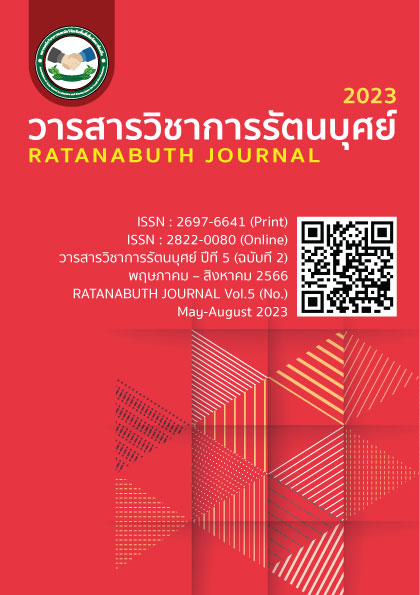The Guideline for Development Educational Institutions are Learning Organizations in The Network Group to Promote the Efficiency of Special Education Center Network 9 The Guideline for Development Educational Institutions are Learning Organizations in The Network Group to Promote the Efficiency of Special Education Center Network 9
Main Article Content
Abstract
The purposes this research were to 1) study the current conditions, desirable condition and need assessment of development educational institutions are learning organizations in the network group to promote the efficiency of special education center network 9. 2) study and evaluation the guideline for development educational institutions are learning organizations in the network group to promote the efficiency of special education center network 9. The research was divided into 2 phases: Phase 1 study the current conditions, desirable condition and need assessment of development educational institutions are learning organizations. The sample group were 291 school administrators and teachers. The research instrument were questionnaires. The statistics used for data analysis were mean and deviation standard. Phase 2: study and evaluation the guideline for development educational institutions are learning organizations. The target groups include 9 experts for assess suitability possibility of guideline. The research instrument were interview form and assessment form of guidelines
The results of the research were as follows:
- The current state in overall was moderate level, the desirable state in overall was in the highest level. The need assessment rank from high to low level was 1) System thinking 2) Personal mastery 3) Team learning 4) Mental model 5) Shared vision
- 2. the guideline for development educational institutions are learning organizations
the guideline for development educational institutions are learning organizations was development program, Include was 1 principles, 2) objectives, 3) contents, 4) development activities, and 5) measurement and evaluation. The Content consists of 5 module Include, module 1 system thinking, module 2 personal mastery, module 3 team learning, module 4 mental model, module 5 Shared vision. Summary of guidelines evaluation, feasibility and utility was the highest in overall.
Article Details

This work is licensed under a Creative Commons Attribution-NonCommercial-NoDerivatives 4.0 International License.
References
เชษฐา ค้าคล่อง. (2557). การพัฒนาโปรแกรมเสริมสร้างภาวะผู้นำแบบมุ่งบริการของผู้บริหารสถานศึกษาขั้นพื้นฐาน. วิทยานิพนธ์ศึกษาศาสตรดุษฎีบัณฑิต. สาขาวิชาบริหารการศึกษา. มหาสารคาม: มหาวิทยาลัยมหาสารคาม.
บุญชม ศรีสะอาด. (2556). การวิจัยเบื้องต้น. พิมพ์ครั้งที่ 9. กรุงเทพฯ: สุวีริยาสาส์น.
ยุรพร ศุทธรัตน์. (2552). องค์การเพื่อการเรียนรู้. กรุงเทพฯ : สำานักพิมพ์แห่งจุฬาลงกรณ์มหาวิทยาลัย.
วิจารณ์ พานิช. (2550). ผู้บริหารองค์กรอัจฉริยะฉบับนักปฏิบัติ. กรุงเทพฯ : สถาบันส่งเสริมการจัดการความรู้เพื่อสังคม (สคส.).
วีรวุธ มาฆะศิรานนท์. (2553). การพัฒนาองค์การแห่งการเรียนรู้. กรุงเทพฯ: เอ็กซเปอร์เน็ท.สำนักบริหารงานการศึกษาพิเศษ. (2559). แผนพัฒนาการจัดการศึกษาสงเคราะห์ ระยะ 5 ปี (พ.ศ. 2560-2564). กรุงเทพฯ: โรงพิมพ์สำนักงานพระพุทธศาสนาแห่งชาติ.
สุวัฒน์ จุลสุวรรณ์. (2559). ปัจจัยที่ส่งผลต่อการเป็นองค์การแห่งการเรียนรู้ของมหาวิทยาลัย. วารสารศึกษาศาสตร์ มหาวิทยาลัยมหาสารคาม, 10(4), 196-197.
สุวิทย์ ยอดสละ. (2556). การพัฒนาภาวะผู้นําเชิงวิสัยทัศน์ของผู้บริหารโรงเรียนประถมศึกษา สังกัดสำนักงานคณะกรรมการการศึกษาขั้นพื้นฐาน. วิทยานิพนธ์ศึกษาศาสตรดุษฎีบัณฑิต. มหาสารคาม: มหาวิทยาลัยมหาสารคาม.
Anne, M. Bowker. (2008). The school-as-learning-community within new public management: The role of organizational structure. In Paper presented at ‘The school-a learning organization?’ conference (pp. 1-21). Norway: Lillehammer.
Cronbach, L. J. (1970). Essentials of Psychological Testing. New York: Harper & Row.
Cummings, T.G. and Worley, C.G. (2009). Organization Development & Change. 9th Edition, South Western Cengage Learning, Mason.
Ellyn, R.L. (2012). Learning organization learning. International Journal of Business and Social Science, 3(6), 217-221.
Garvin, D.A. (1993). Building a Learning Organization. Harward Business Review, July-. August : 778-779.
Krejcie, R. V. & Morgan, D. W. (1970). Determining Sample Size for Research Activities. Educational and Psychological Measurement, 30(3), p. 607-610.
Marco, K., & Louise, S. (2016). What makes a school as learning organization?. Education Working Paper, 28(2), 137.
Senge, P. M. (1990). The fifth discipline :The art and practice of the learning organization. London : Century Press.


